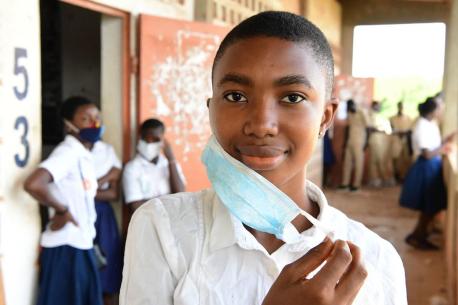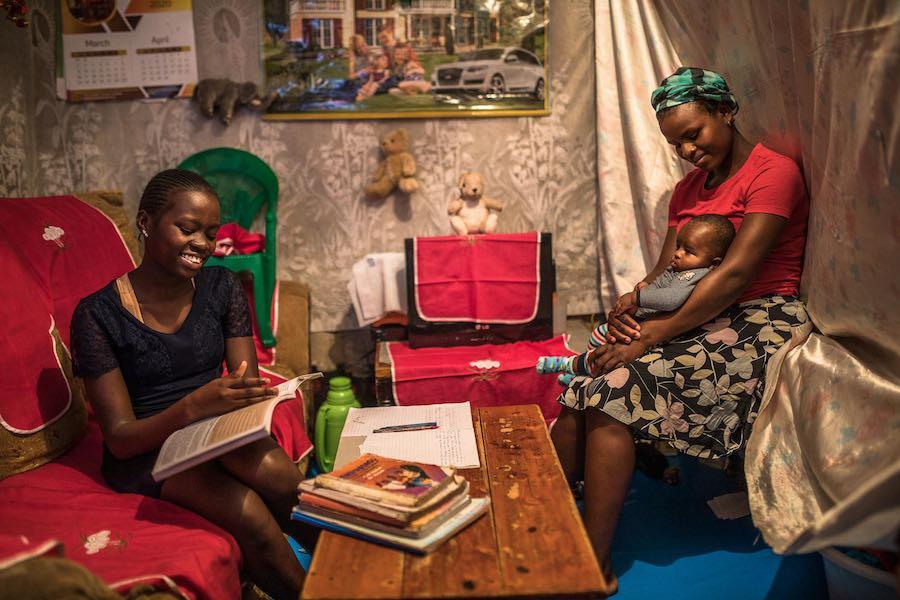
Graduation Gifts that Support the Educational Dreams of Kids in Need
Graduations look different in the U.S. this year. Schools are trying their best with Zoom commencement addresses that grads watch from their homes in cap and gown. TV broadcasts have aired with celebrities and musical guests pitching in to encourage the class of 2020. In May, President Barack Obama took the stage, offering high school graduates and the students at 74 historically black colleges and universities congratulations and inspirational calls to action in televised speeches. Next up, on June 6, President Obama and Former First Lady Michelle Obama will headline YouTube’s “Dear Class of 2020,” each delivering separate commencement addresses and a joint message to all graduates, which will stream live starting at 3 p.m. ET.
For all that support, finding a way to mark this transition — whether it’s a graduation from high school or college or even a moving up ceremony for younger kids — has been tough on children. Their school years ended abruptly, and everyone is feeling the pain of separation from their friends.
Still, students and adults are finding meaningful ways to make these occasions special, many by helping others. Across the U.S., “adopt a senior” campaigns have sprung up on social media, powered by people who are stepping up to offer encouragement and gifts of books and other supplies grads will need if they're heading off to college come fall.
Disappointment over how the school year has ended is, of course, a global phenomenon. School closings because of the coronavirus pandemic have forced 1.6 billion children around the world to find other ways to learn, some under the most challenging circumstances.
The coronavirus pandemic is an especially terrifying prospect for parents who are raising children in crowded refugee camps or in countries where violence and poverty jeopardize their children's right to survive and thrive. But keeping kids learning can provide a comforting continuity that helps them stay focused on the things they can control — and their hopes for the future.
If you'd like to "adopt" a student whose education hung in the balance even before COVID-19, the UNICEF Inspired Education Gifts collection offers all the essentials kids need to live through this crisis and get back on track once they can go back to where they all want to be: at school.

Maria, 9, follows a lesson from her teacher Walid Al-Daghim on her father’s smartphone in their tent at the Kili camp for displaced families in rural Idlib, Syrian Arab Republic. “We had to send children home to their tents to keep them safe,” says Al-Daghim, a volunteer teacher who, like Maria’s family, was forced into the camp by the war. “Teachers here created Whatsapp groups to connect us to our students. With the help of their parents, they can follow the lessons and even send us back questions.”
In makeshift camps like Kili, many children have never even been to school before, so teachers like Al-Daghim must start from scratch. For them, UNICEF Inspired Gifts' School in a Box is an invaluable resource. It can equip a classroom of at least 40 students with all the essentials children need when emergencies and conflicts threaten their fundamental right to education.

Sandra (above, left) and her mom, Winnie, live in Kibera, Kenya, where all schools were closed to curb the spread of COVID-19. Sandra gets her assignments from her teacher via her father's smartphone, then returns them to her teacher for grading. Distance learning allows her to keep up, but she knows it's no replacement for the real thing: "I am worried because I do not know when I will go back to school and when I will finish my exams." © Brian Otieno/Storitellah.com
Keeping children learning — especially during emergencies or outbreaks of diseases like COVID-19 — helps them cope with the turmoil around them. For just $60, you can help children and young people like Sandra by sending a gift of supplies that can help children stay healthy and keep up with their studies: water purifying tablets, soap, exercise books, pencils, a sealable water bucket and a solar-powered radio to connect them with educational broadcasting.
KEEP KIDS HEALTHY, LEARNING AND SAFE

Sports and physical activity strengthen kids' bodies and developing brains, helping them learn and stay focused in school. When times are tough, the pleasure children tap into when playing together or with adults is a powerful antidote to stress and trauma. Here, boys keep a safe physical distance while playing football in Moussadougou, a village in southwest Côte d'Ivoire. © UNICEF/UNI329887/Frank Dejongh
UNICEF Inspired Gifts offer a bundle of five soccer balls for only $45. That's a small price to pay to give children who are braving the COVID-19 pandemic in some of the world's toughest places the healing gift of play.

Safe water is essential to keeping children healthy and learning — particularly girls who often drop out if they don’t have access to clean running water, bathrooms and menstrual hygiene supplies. "We sometimes missed school lessons, or even entire school days, when the pump was broken," says Fatoumata Bocoum, 13, pictured above, on her way to school in Dialangou village in central Mali. She remembers how she would wait patiently by the communal pump for water to arrive — sometimes so long she never made it to school. But with UNICEF's help a new water pump and sanitation facilities were installed, and Fatoumata's life improved. "We're so happy to have separate latrines for girls and boys. But we also have handwashing kits, soap and so much more!” © UNICEF/UNI307713/Keïta

Since March 20, schools in South Sudan have been shut down due to the COVID-19 pandemic. UNICEF, the Ministry of General Education and Instruction and other partners have launched educational radio programs so kids can keep up their studies at home. Above, Angures, 14, tunes into math, science and English radio broadcasts in South Sudan’s capital, Juba: “I miss being in school. I miss learning with teachers. It is not always easy to get what the teachers are saying on the radio and sometimes you need more explanations. I miss being with my friends.” Angures loves science, social science and math, subjects she knows she must master to achieve her dreams: “I want to become a pilot when I grow up.” © UNICEF/UNI332318/Ryeng
Angures has a radio at home. But not all children are so fortunate. For just $50, you can donate a solar-powered windup radio to connect children to educational programming that can keep them on track and working to achieve their goals.

Hamsatou, 13, fled her village in Mali when armed men invaded her community in 2019. “I was terrified. I thought I was going to get killed,” recalls the 13-year-old. But now, she is safe at the Socoura camp for people who have been forced from home by violence. Thanks to the time she spends at the camp’s UNICEF Child-Friendly Space, she’s been able to overcome her trauma and come into her own as an advocate for proper hand washing, one of the best ways to prevent coronavirus infection. Armed with a bar of soap, Hamsatou goes door to door teaching others the hygiene lessons she's learned, showing leadership that's helping her to grow stronger herself every day. © UNICEF/UNI332255/Dicko
For just $25, you can donate 100 bars of soap and empower children like Hamsatou to take their health and safety into their own hands.
HELP FIGHT INFECTIOUS DISEASES LIKE COVID-19

With his notebooks and pencils, the student above is all set for his first day of school at the Venus Star Academy, a UNICEF-supported school in Juba, South Sudan. UNICEF began 2020 by delivering school supplies along with other educational assistance to the children of South Sudan, where long-running conflict has devastated an already fragile education system. With one-third of the schools damaged, UNICEF is now building and rehabbing classrooms across the country, providing students and teachers learning materials and supplies and helping to mitigate the negative impact of the school closures implemented in mid-March to stop the spread of COVID-19. © UNICEF/UNI304361/Ryeng
Exercise books and pencils are essential learning tools. Yet, a nationwide shortage of such learning materials is another major obstacle to getting the 2.2 million South Sudanese children who are out of school learning again.
Top photo: Isabelle Amani, 20, is happy to return to her school in San Pedro, in southwestern Côte d'Ivoire after the coronavirus pandemic forced her to learn from home: “I not only missed my girlfriends enormously, but it was a waste of time and I was bored at home. Fortunately, we can still take exams, and we don't have to retake the school year. Today we start with chemistry, my favorite subject. Later I want to become a chemist." © UNICEF/UNI330836/Frank Dejongh
HOW TO HELP
There are many ways to make a difference
War, famine, poverty, natural disasters — threats to the world's children keep coming. But UNICEF won't stop working to keep children healthy and safe.
UNICEF works in over 190 countries and territories — more places than any other children's organization. UNICEF has the world's largest humanitarian warehouse and, when disaster strikes, can get supplies almost anywhere within 72 hours. Constantly innovating, always advocating for a better world for children, UNICEF works to ensure that every child can grow up healthy, educated, protected and respected.
Would you like to help give all children the opportunity to reach their full potential? There are many ways to get involved.





